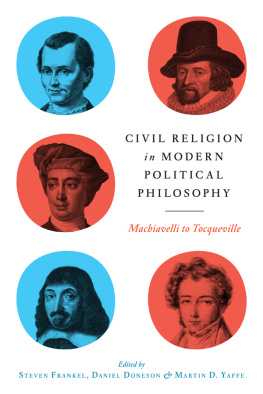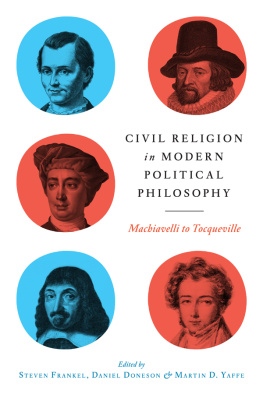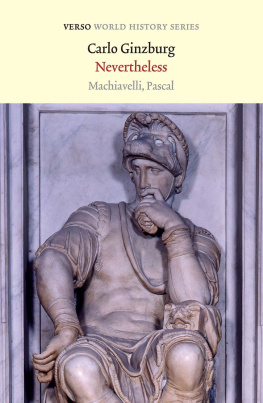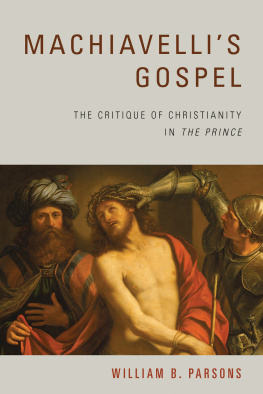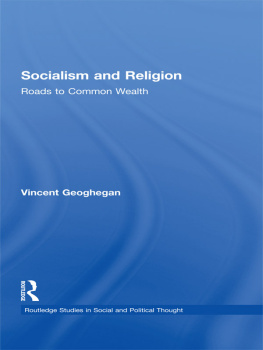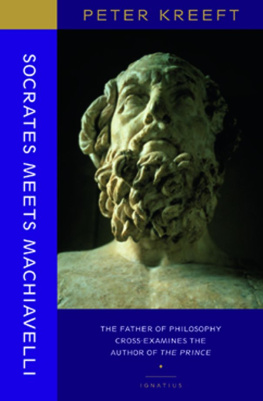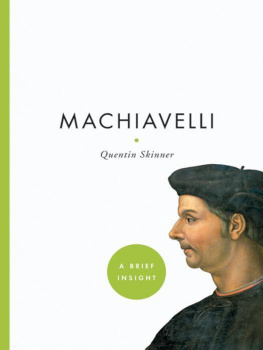Civil Religion in Modern Political Philosophy
Civil Religion in Modern Political Philosophy
Machiavelli to Tocqueville
Edited by Steven Frankel and Martin D. Yaffe
The Pennsylvania State University Press
University Park, Pennsylvania
This book is published with generous support from the College of Arts and Sciences at Xavier University.
Library of Congress Cataloging-in-Publication Data
Names: Frankel, Steven, 1968 editor. | Yaffe, Martin D., editor.
Title: Civil religion in modern political philosophy : Machiavelli to Tocqueville / edited by Steven Frankel and Martin D. Yaffe.
Description: University Park, Pennsylvania : The Pennsylvania State University Press, [2020] | Includes bibliographical references and index.
Summary: A collection of essays on civil religion in modern political philosophy, exploring the engagement between modern thought and the Christian traditionProvided by publisher.
Identifiers: LCCN 2020007695 | ISBN 9780271086156 (cloth)
Subjects: LCSH: Civil religionHistory. | Religion and politicsHistory. | Christianity and politicsHistory. | Political sciencePhilosophyHistory.
Classification: LCC BL98.5 .C579 2020 | DDC 201/.72dc23
LC record available at https://lccn.loc.gov/2020007695
Copyright 2020 The Pennsylvania State University
All rights reserved
Printed in the United States of America
Published by The Pennsylvania State University Press,
University Park, PA 168021003
The Pennsylvania State University Press is a member of the Association of University Presses.
It is the policy of The Pennsylvania State University Press to use acid-free paper. Publications on uncoated stock satisfy the minimum requirements of American National Standard for Information SciencesPermanence of Paper for Printed Library Material, ANSI Z 39.481992.
We dedicate this book to our teachers and students.
CONTENTS
1 / Machiavelli, Christianity, and Civil Religion
Timothy Sean Quinn
2 / How Francis Bacons New Organon Co-opts Biblical Theology for His New Atlantis
Martin D. Yaffe
3 / Leviathans Reconquest of the Christian Person for the State
Mark Shiffman
4 / Will Wonders Never Cease? Spinozas Critique of Miracles
Steven Frankel
5 / Liberalism and Christianity: Lockes Use of the Bible in the Second Treatise
Nasser Behnegar
6 / Montesquieus Machiavellian Account of Civil Religion
Andrea Radasanu
7 / Montesquieu and Christianity in the American Project: The Moderate Spirit of Religious Liberty
Paul Carrese
8 / Hume on Church Establishments: History, Moderation, and Liberty
Aaron Szymkowiak
9 / Rousseaus Civil Religion Problem
John Ray
10 / How the Founders Agreed About Religious Freedom but Disagreed About the Separation of Church and State
Vincent Phillip Muoz and Kevin Vance
11 / Tocqueville on Religion and Democratic Character: Equality, Mediocrity, and Greatness
Aaron L. Herold
This volume grew out of a panel on civil religion at the Northeastern Political Science Association meeting in Philadelphia in 2017. It would not have been possible without the unflagging support and encouragement of Ryan Peterson, our tireless editor at Pennsylvania State University Press. The editors also thank Michael Zuckert and Judd Owen, as well as two anonymous readers of our manuscript, for their meticulous and helpful feedback. Ryan Kambich of Xavier University and Alex Vose of Pennsylvania State University Press prepared the manuscript for publication; we are grateful for their upbeat and competent assistance. We also gratefully acknowledge the generous financial assistance of both the College of Arts and Sciences and the Stephen S. Smith Center at Xavier University. Finally, we thank the following colleagues and friends for their timely and capable help with various indispensable details, large and small: Douglas Anderson, Daniel Doneson, Nancy Ellis, Robert Faulkner, Irene Klaver, Terence Marshall, and Svetozar Minkov.
The study of politics and its relation to religion is hardly a novel endeavor, nor is the philosophical exploration of this theme an exclusively modern one. The ancient world is replete with such examinations, culminating in Platos Laws, a dialogue devoted to demonstrating that the political philosopher has the authority to interpret and guide divine law.1 But while ancient examinations of divine law are characterized by an effort to understand religion as a serious, comprehensive, and authoritative challenge to political rationalism, modern evaluations of religion appear to have far less interest in revelation or its adherents. In Platos Laws, the Athenian Stranger takes great pains to understand the divine law and the attachment of its adherents, particularly with respect to the role of reason in guiding human life. In contrast, modern scholars of political theory tend to dismiss religion out of hand. It is not uncommon for a contemporary scholar to announce at the beginning of his or her study: This is a book written by someone with very little interest in religion as such. What deeply interests me is politics, and political philosophy.2
Perhaps we should not be surprised by such indifference or even hostility to the study of religion and its contribution to political life. There is significant precedent for it. The term civil religion was first employed by Jean Jacques Rousseau in The Social Contract (4.8). Rousseau concedes that flourishing political life requires religious belief on the part of the citizens but adds that Christianity is ill suited to such a role. He instead envisions a simplified form of Christianity more closely tailored to political life: The dogmas of civil religion ought to be few, simple, and exactly worded, without explanation or commentary. The existence of a mighty, intelligent, and beneficent Divinity, possessed of foresight and providence, the life to come, the happiness of the just, the punishment of the wicked, the sanctity of the social contract and the laws: these are its positive dogmas. Its negative dogmas I confine to one, intolerance, which is a part of the cults we have rejected. Rousseau emphasizes the importance of a civil religion that culminates in toleration: Whoever dares to say: Outside the Church is no salvation, ought to be driven from the State. Yet the dogmas he lists are hardly original; indeed, they simply restate Baruch Spinozas dogmas of civil religion for liberal democracy as presented in chapter 14 of the Theologico-Political Treatise. Clearly Rousseau has inherited a view of civil religion that is already part of a tradition of political philosophy.
This tradition of civil religion contains several distinctive features, but perhaps the most startling is the remoteness of the justifications for it from anything resembling philosophical legitimacy. Spinoza, for example, insists that while these dogmas are salutary for political life, they can make no claim to any basis in fact or truth. He asserts instead that each is bound to accommodate these dogmas of faith to suit his own grasp (14.49). In other words, salutary religious beliefs are good for others (not philosophers or potential philosophers). Contemporary political philosophers have obeyed Spinozas command to the extent of downplaying or neglecting the claims of religion altogether. As for why the pursuit of political philosophy obliges one to reject such claims, Spinoza says that the goal of philosophy is nothing but truth, while that of faith... is nothing but obedience and piety (14.54). Nor is Spinoza alone in holding this view. Thomas Hobbes, who claimed to be less audacious than Spinoza, goes further in arguing that religion is destroyed by philosophical reflection: Therefore, when anything therein written is too hard for our examination, we are bidden to captivate our understanding to the words; and not to labour in sifting out a philosophical truth by logic of such mysteries as are not comprehensible, nor fall under any rule of natural science. For it is with the mysteries of our religion as with wholesome pills for the sick, which swallowed whole have the virtue to cure, but chewed, are for the most part cast up again without effect (

